Making Peace with Grief on the Golf Course
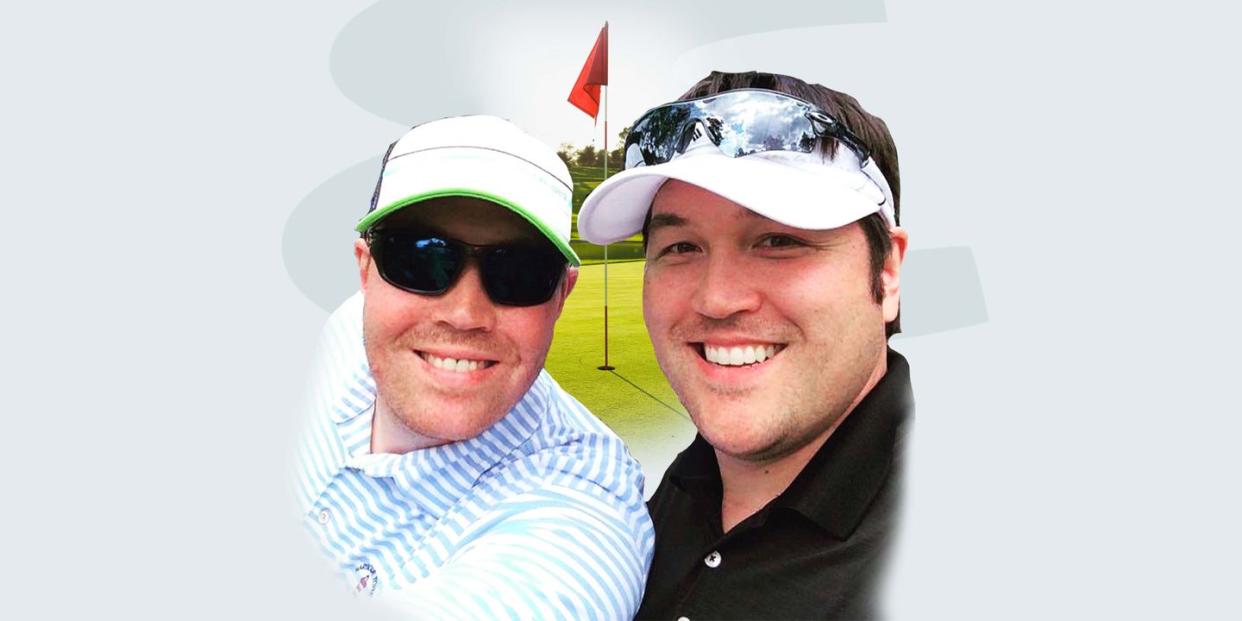
I wasn’t sure what to expect. Pat and I had traded emails and texts for the past six months, but we had never met. Nonetheless, here I was in Chicago, on a bright October day with summer still hanging on, for two days of golf with him and his friends.
Pat had emailed me in January after reading an essay I wrote about my late brother and how we had spent our springs and summers playing golf together. In the essay, I made clear that I was never as good as Tim but that I wanted to be and had dedicated 2022 to both getting better and playing as much golf as I could as a way to keep him close. Pat’s note said that he had enjoyed the essay and that he, too, had lost a brother to lung cancer. At the end of his note, he invited me to join him at his club during the upcoming year.
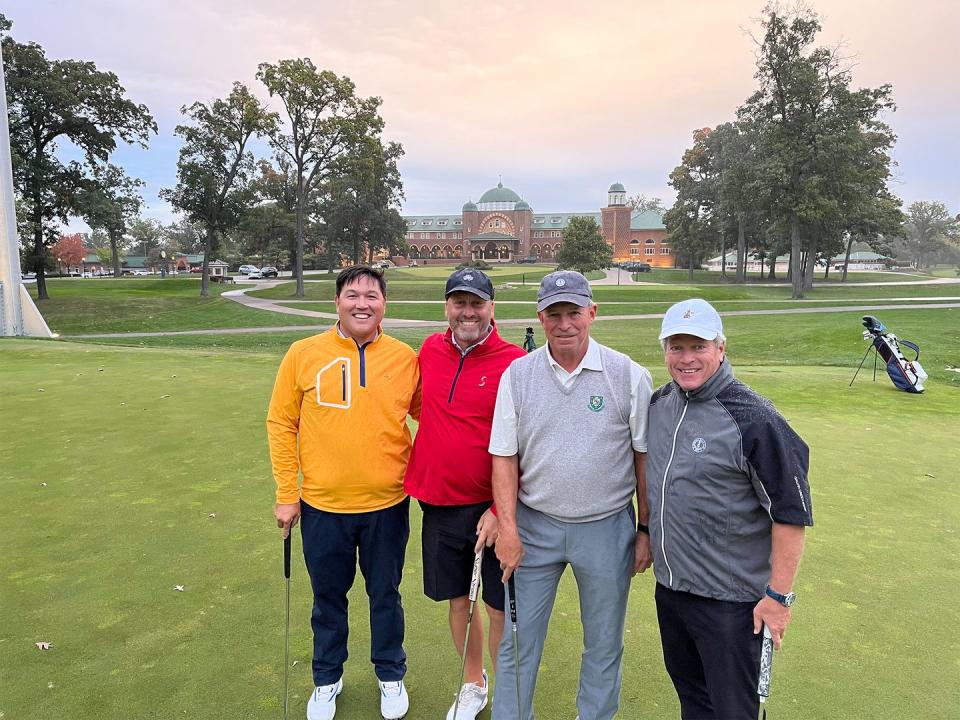
When I told my wife about it, Mary’s first response was “That’s awesome.”
“You think so?”
“Yes,” she said. “I think there are so many people that go through this. There are probably so many guys out there who have lost their playing partners, too.”
“So, I should go?”
“Yes,” she said. “Why not?”
I didn’t have a good reason not to, but I also knew that every round this year, and maybe always, would be a reminder of what was missing in my life. Tim and I were uncommonly close, a fact I had not fully understood until he died. It was appealing to go play golf with someone who would know what I had experienced and was going through, but it also seemed odd to go play with a stranger, even one who had suffered the same loss. My entire golfing life had been built around trips with Tim, not ones without him. But I told Pat I was flattered he’d asked—I was flattered—and that I looked forward to meeting up with him in Chicago at some point in 2022. It was so cold outside when I hit send. Summer was a distant, distant dream, and a part of me wasn’t entirely sure we would make it happen.
Two months after Pat’s note, another friend texted to say he had two tickets to the Masters for me. After the initial wave of excitement, a sadness set in. I couldn’t take Tim. I couldn’t even call him to tell him what, in a different time, would have been our good fortune. When we realized that we had no one we could leave our kids with and that Mary couldn’t come along, I went into a minor crisis. I didn’t know whom to ask. It was the first in a series of events that transpired over 2022 in which I had to leave my brother behind and only carry his memory with me.
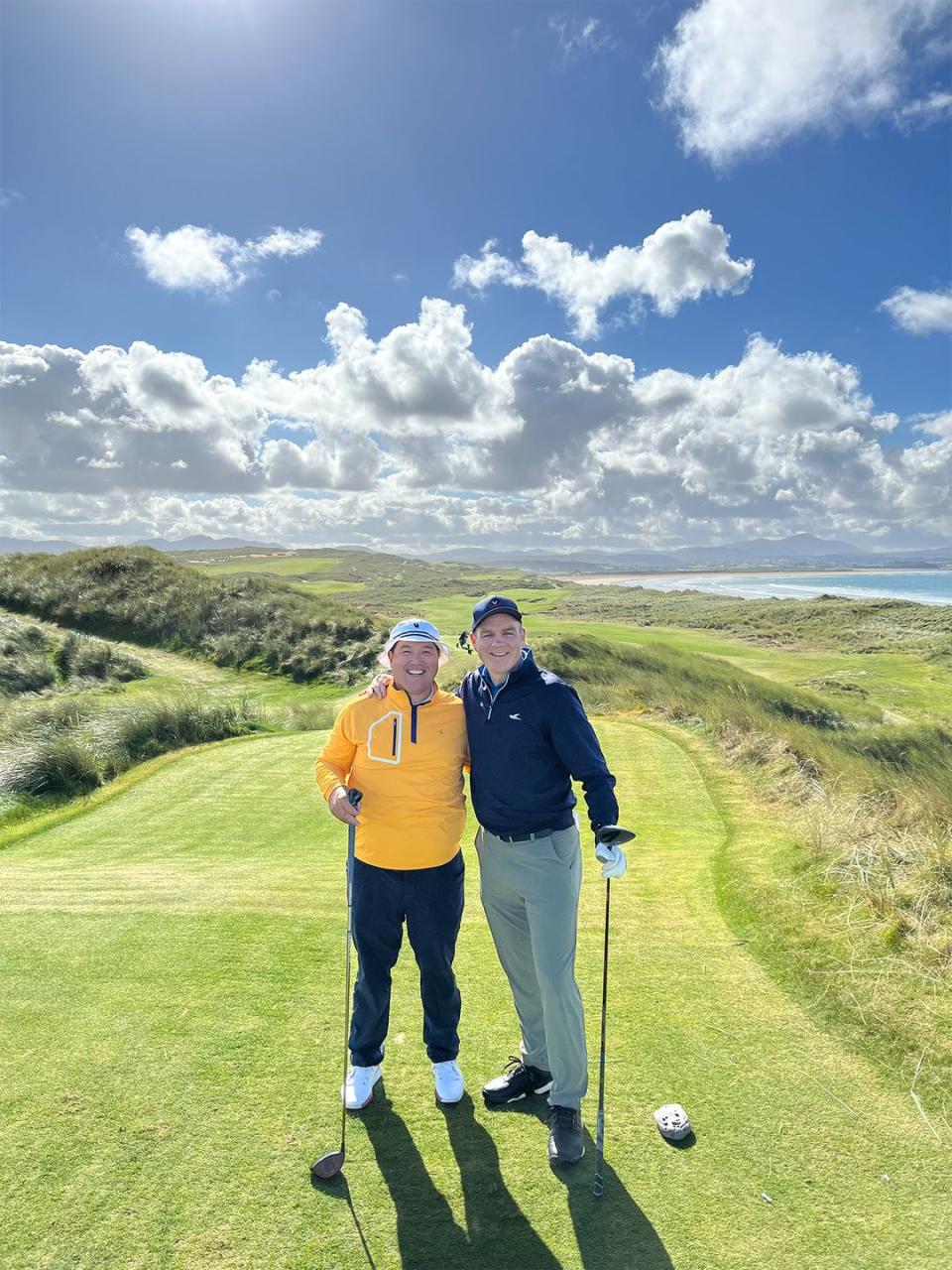
We were in bed, and I was giving Mary different names in the vein of “How about…” and she turned to me and said, “You’ve got to stop. You can’t replace him.” Until she said this, I had not been aware of how hard I was trying to do just that—measuring every guy I met and every friend I had since Tim’s passing as a person to fill his shoes. The truth of what she said, which was filled with love and with her own understanding of what it was like to lose a brother, both saddened and heartened me. “Just take someone with you and have a good time,” she said. “Go enjoy it.”
I went to Augusta, and as summer finally came calling I traveled to nearly every place anyone who plays golf wants to go. From the western coast of Oregon to the western coast of Ireland, I carried my brother’s old clubs and the memories of us playing together, and I tried to love the game of golf as I had when he was alive. I would be lying if I said I achieved that, but even with Tim’s persistent and saddening absence, I had many rounds and many memories that will stay with me forever.
There was Nicole and Mike, whom I met in Canada while we played a par 3 course under the lights. In Cleveland, I met an old friend’s husband for the first time. We talked about grief and how it burrows under your skin. Then, on a trip to Ireland with Tim’s old friend Rob, we met Rod as we walked to the first tee. In the middle of the round, I told Rod about Tim, and two holes later he told me about his own losses, and when we posed for a picture at the end of the round, he put his arm around me and squeezed extra hard. All these rounds, all these strangers that heard my story, helped me see that I would be okay. I didn’t thrive on the course. I didn’t have any rounds in which I didn’t turn my thoughts to Tim, wishing he was along. But I learned that I could also be my own man and not just his little brother. I found my way on my own.
My visit with Pat would be my final memorable trip in a seven-month stretch in which Mary had allowed me to chase after a ghost by chasing after a white ball. The Pat Visit, as it came to be known, was the one, as the days accumulated, I began to most look forward to. And when we met, though I shook his hand, I wanted to embrace him in a hug. Aside from my closest friends, he was the one person who seemed to get it.
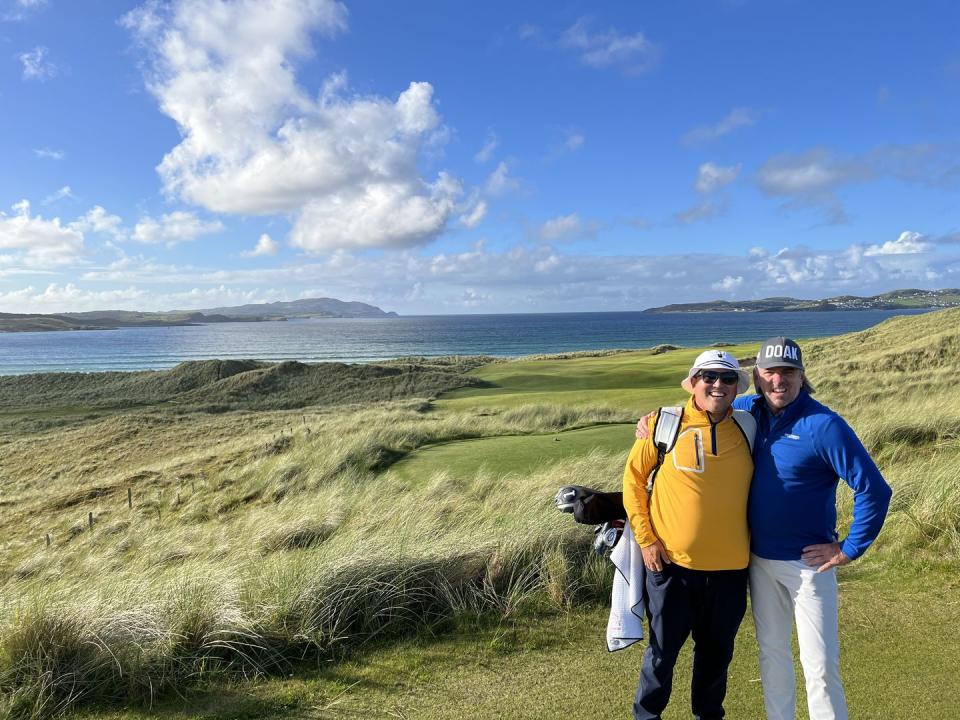
We were paired together on day one and immediately started getting our asses kicked. In golf, you often keep score not just by marking your number of strokes but also by marking dots. The dots are not a universal measure—everyone’s system and dot symbolization are different. Pat and I were down so many dots by the fourteenth hole that the card looked like a braille version of War and Peace. Then we stormed back. We won the fifteenth hole. Pat is a fit sixty-three. Full head of silver hair. Everyone else orders fries, he gets fruit. Everyone else laments the flat-bellies on the range, he fits in. Aside from the hair, the only telltale sign of his age is the bowlegged walk of an aging athlete whose cartilage has worn away in both knees. He got excited when we won that hole. “Here we go,” he said, and instead of fist-bumping me, as had been our norm, he bumped his shoulder into mine, a big grin across his face. And I felt the old fire I used to feel when Tim and I were in matches against our friends. The only way to say this is the simplest way: It felt so good.
Coincidentally, Pat’s brother was named Mike. He was the oldest of five, and as Pat said when I asked him why he reached out to me, “I saw so many similarities in how you felt about your brother and how I felt about Mike.” Mike’s death from cancer was eerily similar to my brother’s. Like Tim, Mike had what he thought was a benign problem that turned out to be much worse. While at Pat’s for Thanksgiving in 2018, Mike complained about pains in his back that he thought were just spasms. He woke up on Christmas Day and couldn’t walk. An MRI revealed a tumor on his spine. He had emergency surgery, and although they were able to remove most of the tumor, they detected cancer in his hips and breastplate. Doctors determined later that the cancer had originated in the lining of his lungs and had metastasized as stage 4 lung cancer. In May 2020, after eighteen months of treatment, the cancer spread to his spinal fluid and couldn’t be treated. He would pass later that December.
My brother had a cough he dismissed as a cold. Doctors originally misdiagnosed it as walking pneumonia. In August 2018, the week before his doctors confirmed the worst—that what he had instead was in fact cancer—he and I had been in Pinehurst, North Carolina, playing golf. For a time, we thought he would be okay. Then in 2020, at the height of the pandemic, he began visiting the hospital more and more frequently and having to visit them alone. But Pat and I didn’t talk about these details when we were together playing. We talked about them after, when I returned to Columbus.
Our brothers only came up briefly on my second day of golf with Pat, and only on one hole. We didn’t need to talk about them. They were the reason we were together, on the course. The cold morning gave way to a mild afternoon. Pat and I were on opposing teams, but I spent most of the day feeling silently thankful for his company. As we came up the eighteenth, I hoped someone would ask me to play another eighteen. I wanted to keep in that moment, in that feeling of gratitude and remembrance, longer.
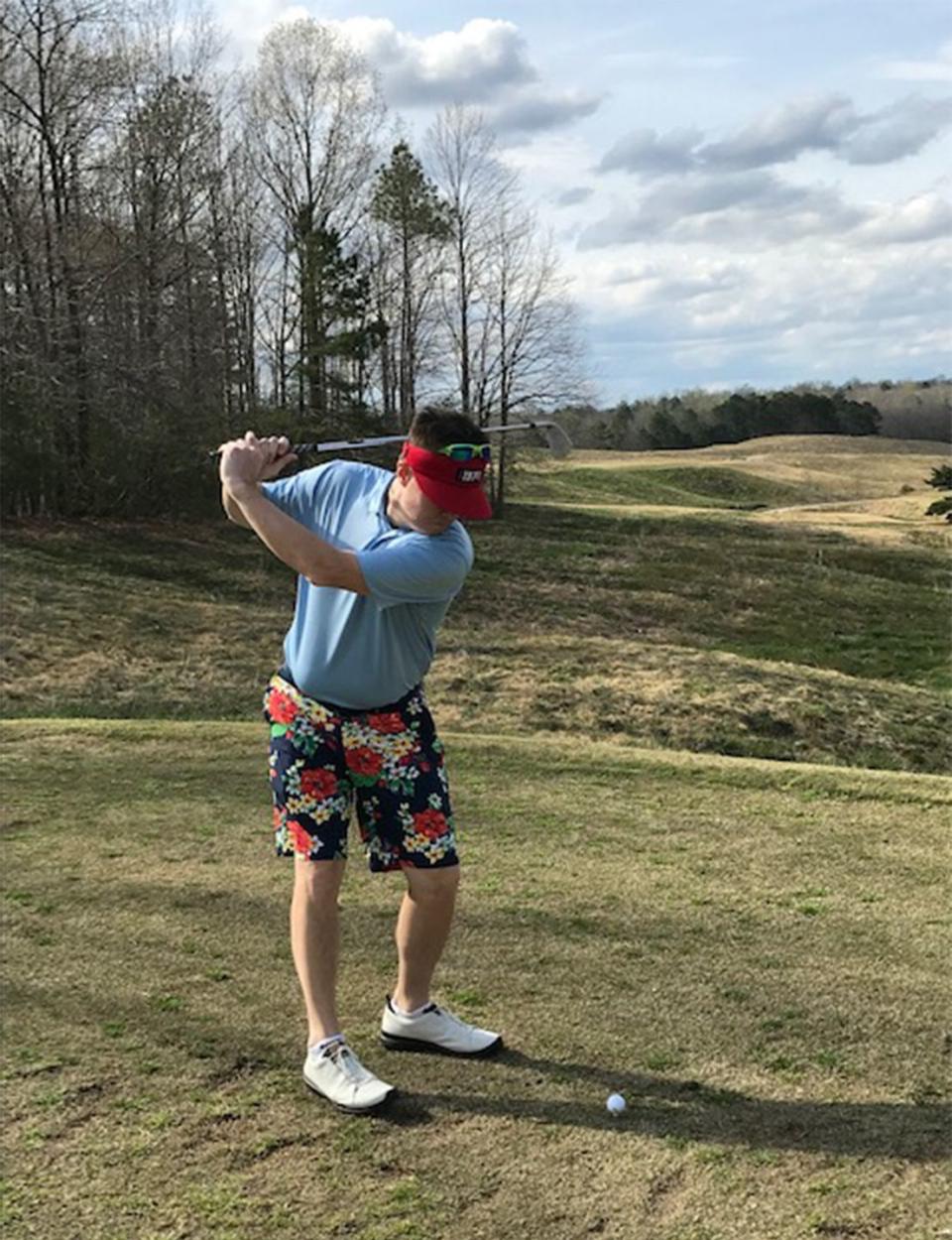
One of the great courtesies of golf is that at the end of the round, you remove your hat and shake hands. When it was time to shake Pat’s, I did give him a hug this time and told him how much I appreciated the past two days. I had been touched by his note but even more by how welcoming and friendly Pat had been. It’s not that I hadn’t expected him to be a good person, but he was such a good person, so much more than I’d expected, that I hoped, as we pulled out of the parking lot, we would stay in touch.
That night, after a long drive home, during which I had meditated on the past two days, I sent Pat a text to thank him once more and tell him how meaningful the past couple days were to me. He had been gracious and kind. He had sent me that note after reading an essay filled with grief. It was clear to anyone who read it how I felt about my brother and how much I missed him and always would. And in the middle of that grief, a stranger had reached out to tell me he understood and asked me to play golf.
Pat’s reply came almost immediately. “I miss my brother Mike, and just being with you, knowing you had the same horrible journey, was therapeutic. I’m glad I reached out, and I’m glad you accepted my invite.”
I got very quiet after reading the text, and Mary asked what was wrong. “Nothing,” I said. I read her Pat’s note. “That’s so amazing,” she said.
“It never occurred me to that I was doing anything for him,” I said. When I tell Pat this same thing weeks later, he laughs.
“I always tell people who don’t play golf, You don’t know what you’re missing. You spend four hours with someone, and if they’re a good person, you’ve got a friend for life.”
Tim and I came to golf late. When we were boys, it was not a game we were drawn to. We weren’t members of the country club in our hometown, which was the only place you could play, and, perhaps even more, golf would have been a sport we called soft when we were kids. We were into pushing ourselves to the edge of our physical limits, to the edge of tolerable pain. But once we started playing—first Tim and then me, following along as always—we fell in love with the sport. Part of it was the challenge, to be certain. But I think what we liked about the game was being outside in nature. We had spent many days as boys out in the country with our father, near where he had grown up, on a rambling piece of land in the mountains he purchased with his brother. There have been very few times in my life when I have not thought about that land, those endless days, while playing golf.
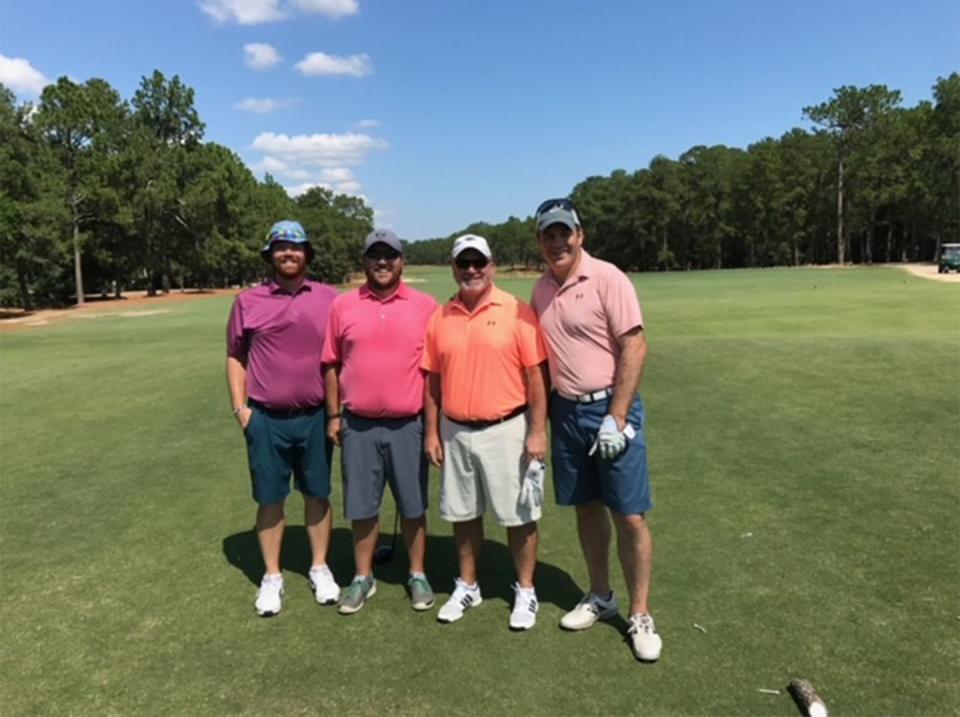
There’s a saying that golf was invented so men could talk to each other, but Tim and I didn’t talk on the course. We saved that for the car rides home or the meals afterward. We were so close, so alike in mind and thought, maybe we didn’t have to. And what I liked about being with Pat was that we could be quiet about the thing that bound us together. Just as surely as I thought of Tim that day, he thought of Mike and all the moments of their own life together.
You can’t be quiet with other men on a basketball court or football field. Reactive sports are not contemplative ones. Golf gives you something to do, but it gives you time to think, too. For a long time, I was mildly embarrassed about how much I loved golf. A little too preppy at times, a little too monied at others. But I came to love golf for the ways it challenged me to get my mind to work with my body, for how it denies mastery. What became most important about it, of course, was the time it gave me with my brother, and then he was taken away from me. In this year of grief, I turned to golf at a time when I was ready to walk away from it forever, because I thought it would always hurt too much without him. If I had done that, of course, I wouldn’t have met Pat or any of the other men I’ve met this year who’ve read my story and offered a word of condolence or hand of comfort. But that’s not what is most important. If I hadn’t turned into my grief, accepted that it was now part of my life, like a new appendage I didn’t ask for or need, I might have lost myself.
Instead I allowed it to exist, and in that abyss were friends I had yet to meet, who let me feel that though it might be even darker and colder than I thought, it would not carry me away. Because they were already there, and we could walk together through it.
You Might Also Like

